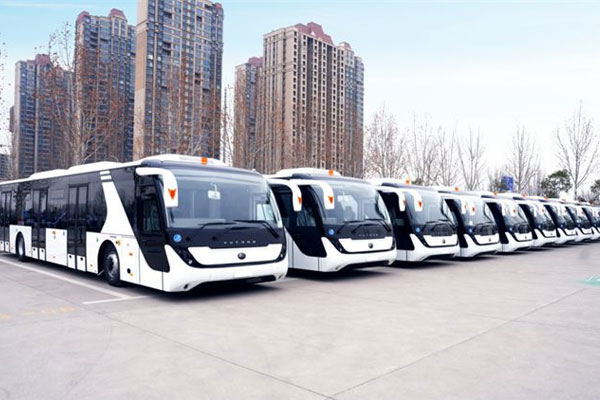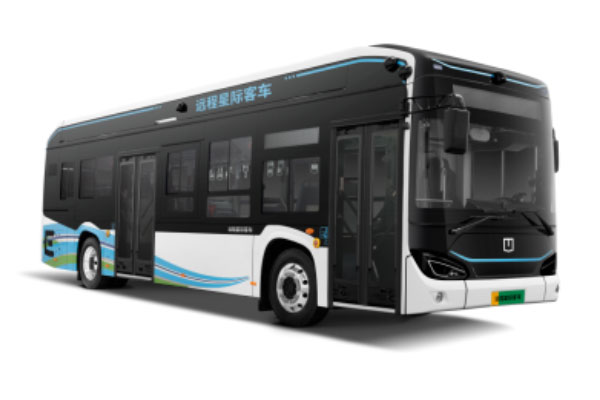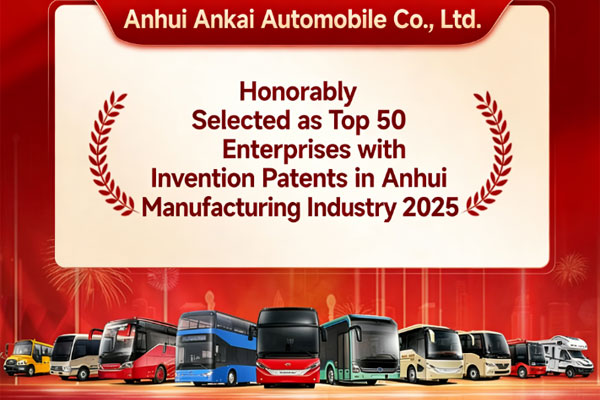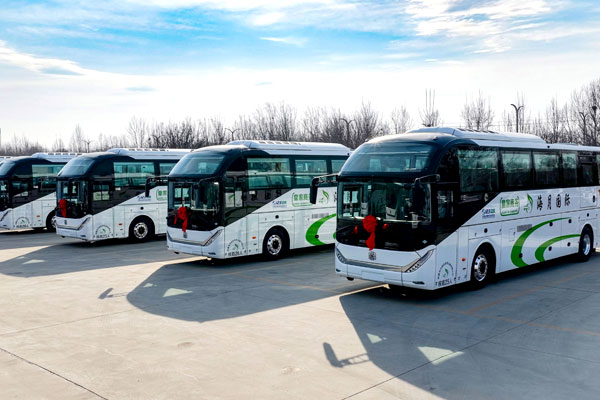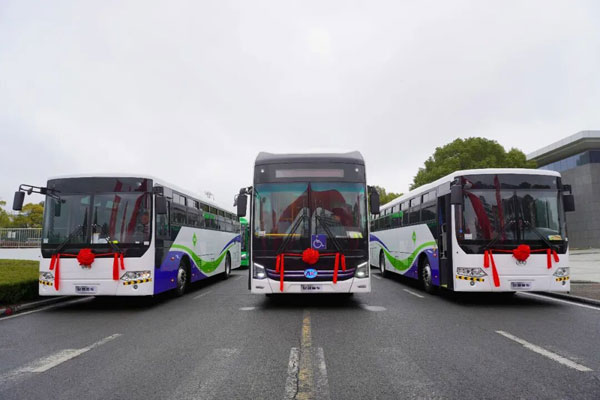Golden Dragon Bus Powers Indonesia's Transition to Electric Buses
24 October 2024
China leads the world in the transition to electric buses, both in terms of product technology and market application. As a result, China's successful experience is welcomed and recognized by many countries and regions that are in the early stages of this transition. Nowadays, bus companies represented by Golden Dragon Bus are embarking on a new journey overseas. They are leveraging the extensive experience accumulated in the Chinese market, combined with the actual needs of overseas target markets. By providing reliable electric bus products and systematic solutions, they assist overseas clients in achieving the transition to electric buses.
Following the delivery of 22 units of 12-meter low-entry electric buses in 2023, Golden Dragon Bus has secured an order for 90 units of 12-meter high-floor electric buses this year through bidding, marking the largest order for electric buses in the Indonesian market to date.
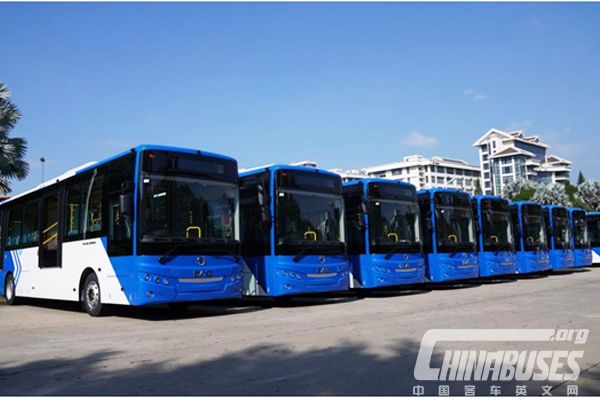
Indonesia, known as the "Country of a Thousand Islands," spans approximately 1.91 million square kilometers and has a population of around 280 million, making it the fourth most populous country globally. Due to its unique geographical constraints, public transportation primarily relies on roads and air travel. With a large population, the demand for bus transportation in Indonesia is significant. Currently, most buses in Indonesia are traditional diesel-powered, with only a few running on natural gas or electricity. To mitigate vehicular greenhouse gas emissions, the Indonesian government signed a decree in 2019 to accelerate the transition to electric transportation. Government procurement of vehicles, including buses, will gradually shift to new energy models.
Take the capital city, Jakarta, as an example. Since 2023, it has issued multiple policies promoting the use of electric buses, including measures to accelerate the adoption of electric vehicles through direct procurement or funding, the construction of electric vehicle charging infrastructure, and a target for Transjakarta (the BRT system) to use 10,047 electric buses by 2030.
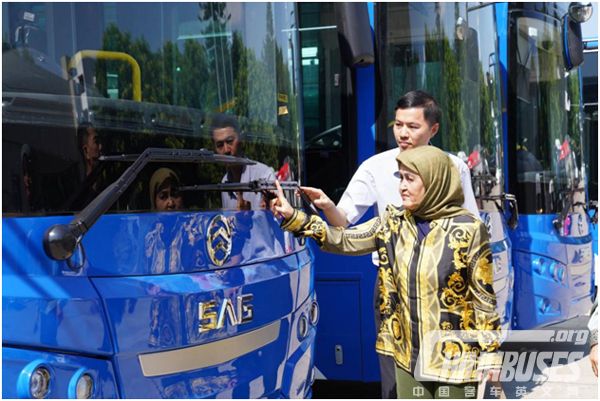
PT. BIANGLALA METROPOLITAN (PT.BMP), one of the bus operators in Jakarta, was established in 1991 and primarily engages in transportation services, especially urban bus services. The company owns about 500 diesel buses, 22 of which have been replaced with electric buses, making it a pioneer in Jakarta's transition to electric buses.
According to relevant personnel from PT.BMP, the 22 units of Golden Dragon electric buses that began operating last year mainly serve non-BRT and mixed traffic routes, operating from 4 a.m. to 11 p.m. and covering an average of 244 kilometers per day. As of now, these buses have traveled over 70,000 kilometers on average, with overall good performance. Additionally, the person in charge mentioned that these electric buses are more cost-effective and efficient in operation and maintenance, with energy costs being half that of diesel buses. The company plans to deploy the newly delivered 90 electric buses on dedicated BRT routes.
During the transition to electric buses, Indonesia, like many other countries and markets, faces challenges such as funding and infrastructure. Firstly, there is a lack of infrastructure; many regions in Indonesia do not have sufficient charging facilities to support electric vehicle energy replenishment. Secondly, there is financial pressure; compared to traditional diesel vehicles, the initial investment in electric vehicles and charging infrastructure remains high, and local banks' financing policies do not adequately support electric vehicles, especially buses. Thirdly, there is a shortage of professionals; Indonesian bus companies lack trained technicians to maintain electric vehicles. Finally, there are lingering doubts among the Indonesian public about the reliability and efficiency of electric buses.
Evidently, Indonesia's transition to electric buses not only presents enormous market opportunities for Chinese bus manufacturers but also poses higher requirements for them. To seize this opportunity, bus companies must possess deep market penetration capabilities and provide products and service solutions that better align with local conditions for Indonesian bus clients.
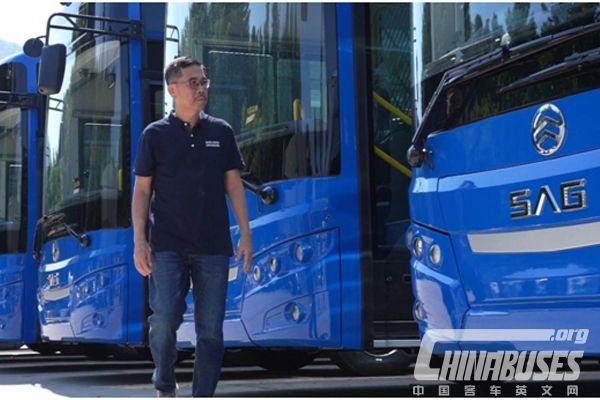
Golden Dragon Bus has a 20-year history in the Indonesian market, with a profound understanding and rich experience in the local tourist transportation market. The Golden Dragon team has conducted in-depth field investigations of the terrain and road conditions on different Indonesian islands. For example, Java, stretching over a thousand kilometers east-west, features plains with good road infrastructure and high-speed requirements, while Sumatra, running north-south for over a thousand kilometers, features mountainous terrain requiring good climbing performance for vehicles. Based on these terrain characteristics, as well as the local climate, operating conditions, and public needs, Golden Dragon has specifically designed and developed diesel bus chassis products, which now cover major islands such as Sumatra, Java, and Sulawesi. Meanwhile, the Golden Dragon technical team, as early as 2014, conducted multiple market surveys and collected road condition data for bus models in the Jakarta area, leading to the in-depth development of exclusive models. Building on the features of previous models and complying with local regulations, these buses were designed to be lightweight, allowing for more passengers to be carried under the same total weight. Nowadays, Golden Dragon has successfully replicated this customization capability in the field of electric buses to meet the diverse needs of Indonesia's transition to electric buses across different regions.
Taking the newly delivered 90 units of 12-meter high-floor electric buses as an example, Golden Dragon has tailored them to Indonesia's high-temperature, high-humidity, and high-corrosion environment. On top of the body's cathodic electrophoresis, additional anti-corrosion coatings and rust-preventive oil processes have been applied, and components are made of lightweight and corrosion-resistant materials to extend the vehicle's lifespan. The buses are equipped with the latest generation of commercial batteries from Contemporary Amperex Technology Co. Limited (CATL), offering significantly improved energy density and safety. This not only reduces the space required for battery installation but also extends the battery warranty from 8 to 10 years. The axles feature imported maintenance-free wheel ends, eliminating the need for maintenance within eight years, thus reducing after-sales maintenance workload and costs and enhancing vehicle operational efficiency.
In addition to providing stable and reliable bus products, Golden Dragon also offers Indonesian bus operators a systematic solution to smoothly transition to electric buses. This includes comprehensive technical training, remote support, on-site services, spare parts supply, regular maintenance, training material updates, performance monitoring and optimization, and team building, ensuring clients receive all-around support and efficient services during the transition.
Golden Dragon maintains close cooperation with its long-term Indonesian partner, SAG. Together, they provide Indonesian clients with excellent bus products and professional services, from pre-sales consultation and market research to parts supply and after-sales service. SAG is confident in the partnership's future and plans to introduce Golden Dragon's electric bus chassis for local assembly in the future to further increase market share. As Chen Chaoyun, Sales Director of Golden Dragon Asia-Pacific, remarks, "After 20 years of cultivation and a decade of waiting, this toughest of markets is finally blossoming again."
Source : www.chinabuses.org
Editor : Lucy
Views:15992



